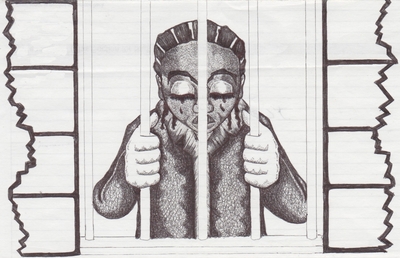
Prison is War on our Children

All Power to New Afrika
In the previous issues of the ULK there have been several articles, wherein, We expanded upon how these prisons serve as a repressive arm of the oppressor nation, and how they are used as an apparatus to wage war against New Afrikans and other oppressed nations here in United $tates. There have been some well written diatribes, however, We’ve neglected to point out how this way impacts our children.
There are approximately 1.7 million parents incarcerated across the United $tates, leaving behind approximately 3 million children suffering the loss of a mother, or the loss of a father, and in some cases the loss of both primary care givers. This has resulted in Our children suffering immense trauma due to their separation from their parents, similar to that of losing their parent to death. This can lead to severe depression, anxiety, high-rates of obesity and behavioral issues.
The combination of trauma, shame and stigma has led the Centers for Disease Control and Prevention (CDC) to label paternal incarceration an Adverse Childhood Experiences (A.C.E.).
Currently, 50% of juveniles that are in detention centers actually have a parent in prison and there are some studies that say children of incarcerated parents are 7 times more likely to end up in prison than their peers.
One in 57 children of European descendant have a parent that is incarcerated, it is 1 in 28 for Chican@ children and to no surprise 1 in 9 New Afrikan children have a parent that is incarcerated.
You see when a parent is charged with committing a “crime” law enforcement and the judicial system intervenes a behalf of the “victim” of the committed “crime,” however, no one intervenes on behalf of the children of the prisoner. These children are left to suffer.
This is by design. The aforementioned numbers reflect the genocide being carried out against New Afrikans.
Article II of the Convention of the Prevention and Punishment of the Crime of Genocide, adopted by United Nations General Assembly on December 9, 1948 states in part that Genocide means ANY of the following acts committed with INTENT to destroy in whole or part, a national, ethical, “racial” or religious group, as such:
A. Killing members of the group;
B. Causing serious bodily or mental harm to members of the group;
C. Deliberately inflicting on the group conditions of life calculated to bring about its physical destruction in whole or in part;
D. Imposing measures intended to prevent births within the group.
The oppressor nation has had well over 400 years to perfect those methods of genocide. Beginning with the aggressive European invasion of Afrika, it progressed with the euro-Amerikkkan slave trade during which millions of Afrikans died during the “middle passage.” All the deaths of Afrikans on slave ships at the hands of village raids, and city police, were acts of genocide.
Amerikkka is still the enemy, and today it uses its prisons as genocidal weapons. Amerikkkan prisons are instruments used to practice political, economic, and social oppression of New Afrikan people. Prisons are used to practice genocide, to practice physical and mental destruction of the group, and as one of the instruments used to prevent the group’s successful struggle for liberation Amerikkan prisons are Koncentration Kamps. The entire U.$. “criminal justice system” is used as an arm of the government to repress and destroy the national liberation struggle, sadly this includes our children.
Post Script: i need to inform North Carolina Prisoners that our (S.W.A.P) address has changed. Prisoners should write to:
PO Box 15092
Durham, NC 27704
At the moment our support is limited to providing the New Afrikan P.O.W. Journals to NC prisoners. If you are interested in supporting the Do M.O.R.E. (Mobilize Organize Revolutionize & Educate) campaign. i entreat that you write to us with your ideas.
The primary objective of the campaign is to have the Security Risk Group (SRG) sanctions and restrictions removed from prisoners who don’t pose a “threat” to the “security” of the prison system. Please write for details.







